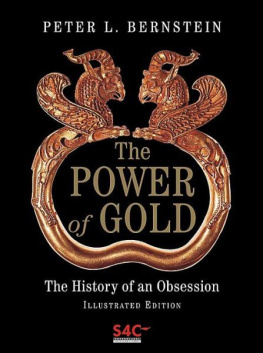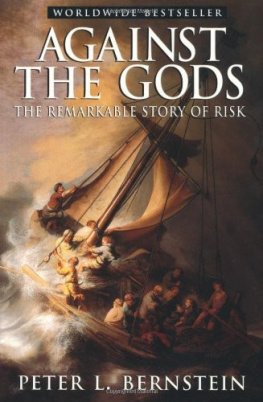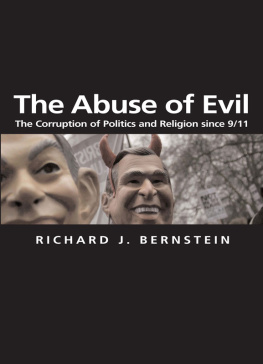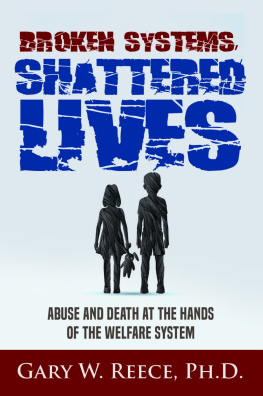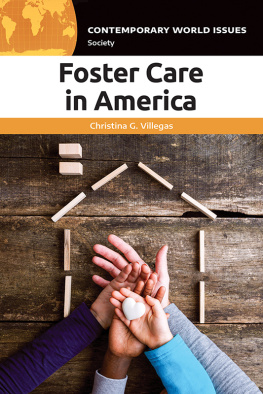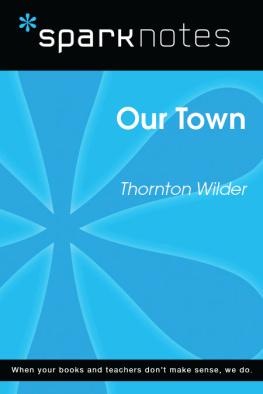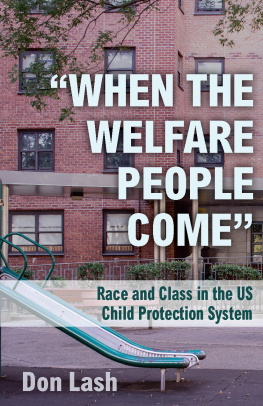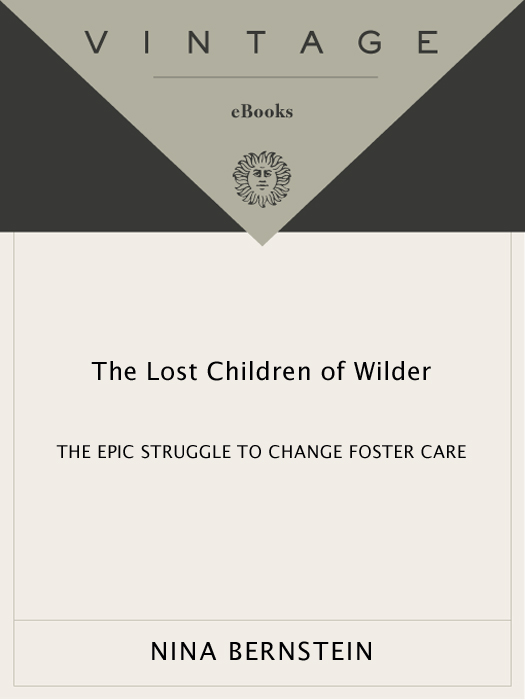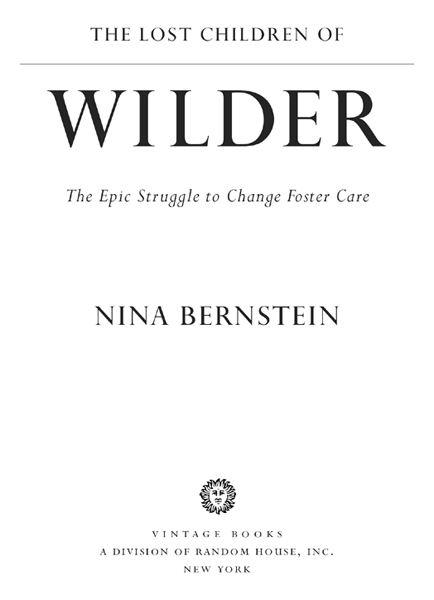Acclaim for Nina Bernsteins
THE LOST CHILDREN Of WILDER
[Bernsteins] accountgripping, capricious, and humaneis reminiscent of a Dickens novel.
The New Yorker
One of those rare nonfiction books that is quite likely to stay with [its] readers forever.
St. Louis Post-Dispatch
Bernstein is a terrific, dogged reporter. At times, the profusion of detail lifts Bernsteins writing to a kind of poetry.
Chicago Tribune
An impressive feat. Bernstein has performed a valuable public service, recording an important chapter in New York Citys social history.
Newsday
A remarkable feat of reporting and storytelling. A disturbing and riveting narrative that should be required reading for anyone who professes concern for children.
Alex Kotlowitz, author of There Are No Children Here
A compelling, panoramic drama a satisfying read that enlightens, unsettles, and nudges us toward introspectiona book that is, in the best sense, provocative.
Elle
These are painful stories, and Bernstein tells them with care and understanding.
The Boston Globe
Bernsteins success is the thoroughness and nuance with which she chronicles the endless loop of child welfare reform, and the lives of the successive generations of children who tumble through each repeating cycle.
The Washington Post
The Lost Children of Wilder is such a compelling and troubling book that you may be tempted to put it aside only long enough to hug your kids.
New York Law Journal
Combine[s] prodigious reporting with literary perceptiveness about human motives.
The Christian Science Monitor
Journalism of the highest order, a truth-telling work that has the eloquence to change the national debate on child welfare. Bernstein manages this powerful indictment, leveled in many directions, through a story that is as rich in detail and as human as a novel.
Youth Today
Bernsteins mini-portraits of lawyers, judges, social workers, private-sector providers, elected and appointed officials are empathetic but unsparing.
The Atlanta Journal-Constitution
In the spirit of journalists such as Alex Kotlowitz and Ron Suskind, [Bernstein] brings the story to life by focusing on one family ravaged by the system.
Brills Content
This viscerally powerful history of institutionalized child abuse and the criminalization of poverty, of civil rights and social change, is compelling and essential reading.
Publishers Weekly (starred review)
A human saga of broken homes, broken children, and broken laws.
Richmond Times-Dispatch
 Nina Bernstein
Nina Bernstein THE LOST CHILDREN
OF WILDER
Nina Bernstein is a reporter for The New York Times. In 1994 her New York Newsday series about Wilder won Columbia University School of Journalisms Mike Berger Award, and she was awarded an Alicia Patterson Foundation fellowship to continue her research into foster care. In 1995 she received the George Polk Award for distinguished metropolitan coverage. She lives in New York City.
FIRST VINTAGE BOOKS EDITION, FEBRUARY 2002
Copyright 2001 by Nina Bernstein
All rights reserved under International and Pan-American Copyright Conventions. Published in the United States by Vintage Books, a division of Random House, Inc., New York, and simultaneously in Canada by Random House of Canada Limited, Toronto. Originally published in hardcover in the United States by Pantheon Books, a division of Random House, Inc., New York, in 2001.
Vintage and colophon are registered trademarks of Random House, Inc.
The Library of Congress has cataloged the Pantheon edition as follows:
Bernstein, Nina.
The lost children of Wilder / Nina Bernstein.
p. cm
eISBN: 978-0-307-78774-3
1. Foster childrenNew York (State)New York. 2. Foster children Legal status, laws, etc.New York (State)New York. 3. Child welfare New York (State)New York. 4. Wilder, ShirleyTrials, litigation, etc. 1. Title.
HV885. N5 B46 2001
362.733097471dc21 00-057456
Author photograph Suzanne DeChillo
www.vintagebooks.com
v3.1
To my parents
to Andreas
and for everyones children
CONTENTS
A case can act as a midwife to change. You cant read the social forces in advance. Society changes in relation to the case. You cannot foresee the outcome.
PAUL CHEVIGNY
INTRODUCTION
EARLY IN 1990, researching a newspaper article on New York City foster care, I spent a morning with a stack of court documents from a long-standing lawsuit known as Wilder. The lawsuit, citing the First Amendments separation of church and state and the Fourteenth Amendments guarantee of equal protection, had challenged New York Citys 150-year-old foster-care system in 1973 for giving private, mostly religious agencies control of publicly financed foster-care beds. The Catholic and Jewish charities that dominated the field were by law allowed to give preference to their own kind. Black, Protestant children had to wait or do without. The system did poorly by all children, the suit charged, because it placed them according to creed and convenience, not according to their needs.
In the marble and mahogany splendor of Manhattans federal courthouse in the 1990s, lawyers often likened the Wilder case to Jarndyce and Jarndyce, the suit in Dickenss Bleak House that dragged on for so long that people forgot what it meant. Wilders course paralleled a national trajectory from great optimism to great skepticism about the possibility of righting social wrongs through the courts. Yet Wilder had engaged the passions of three generations of social reformers even as it fell short of helping three generations of children in foster care.
Halfway through the legal papers, I found, tucked in a paragraph of the fourth amended complaint, a fact that I could not forget: Shirley Wilder, the named plaintiff, had given birth to a son and placed him in foster care in 1974. I wanted to know what had happened to that baby, and to understand why.

THE TWO-HUNDRED-YEAR HISTORY of American child welfare is littered with programs once hailed as reforms and later decried as harmful or ineffective, only to emerge again in the guise of new solutions to past failures. Why do these problems seem so intractable, so often only redefined, rather than remedied, by changed laws and new philosophies?
The answers, I believe, are mirrored in the Wilder lawsuit. They lie in the child welfare systems place as a political battleground for abiding national conflicts over race, religion, gender, and inequality. They are found in the unacknowledged contradictions between policies that punish the undeserving poor and pledges to help all needy children. And during twenty-six years of Wilder litigation, the lost children of Wilder grew up with the consequences.


